|
|
|
Sort Order |
|
|
|
Items / Page
|
|
|
|
|
|
|
| Srl | Item |
| 1 |
ID:
113729
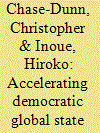

|
|
|
|
|
| Publication |
2012.
|
| Summary/Abstract |
This article discusses the evolution of the international system and global governance within the Europe-centred modern world-system since the 15th century in the context of a comparative framework that includes interpolity systems since the Stone Age. The evolution of the modern system includes the emergence of the European system of sovereign national states and colonial empires, the extension of the Westphalian system to the non-core by succeeding waves of decolonization, the rise and fall of successively larger hegemons, the deepening of global capitalism in waves of globalization, the emergence of weak international regulatory institutions and the prospects for and the rapid emergence of global democracy. It is not claimed that a global state has already emerged, but the authors see the long-term processes as the early stages of the emergence of a world state, and consider how these processes might be accelerated within the next few decades. The need for democratization of the institutions of global governance is also discussed. However, in this article, the focus is more on real geo-historical processes than normative questions, outlining the evolution of interpolity institutional orders, describing the challenges in thinking about global state formation, and discussing some of the technological and political forces that might accelerate the long-term trend toward global state formation.
|
|
|
|
|
|
|
|
|
|
|
|
|
|
|
|
| 2 |
ID:
154717
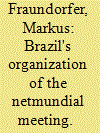

|
|
|
|
|
| Summary/Abstract |
In the face of the apparent weaknesses of the state system to find meaningful solutions to global challenges such as the regulation of the Internet, more democratic forms of governance may show more creative and innovative ways to move forward. Instead of focusing once again on the usual suspects in this debate (civil society actors, Western state actors, or international organizations), this article sheds light on the role of Brazil, a developing democracy from the Global South. The article examines Brazil's organization of the 2014 Global Multistakeholder Meeting on the Future of Internet Governance (NETmundial) in São Paulo. NETmundial allowed governments, civil society organizations, private actors, and local Internet communities to elaborate a human rights declaration on global Internet governance. The article explores why this multistakeholder process was so successful compared to previous multistakeholder approaches in global Internet governance. In the same vein, it argues that Brazil was capable of organizing a multistakeholder meeting based on three particular democratic elements: the promotion of human rights, the creation of participatory mechanisms, and the establishment of accountability mechanisms.
|
|
|
|
|
|
|
|
|
|
|
|
|
|
|
|
| 3 |
ID:
160124


|
|
|
|
|
| Summary/Abstract |
International politics has often been viewed as a brutal place where might trumps right and where, as a consequence, questions of democracy are irrelevant to ask. In the last decades, however, scholars and political leaders have increasingly suggested that elements of democracy exist in governance beyond individual states. If this is so, how does democracy beyond the state shape international politics? This article suggests conceptual preliminaries for theorising consequences of democracy beyond the state in general and their implications for problems of peace and conflict in particular. The purpose is twofold: first, to begin reconstructing existing normative democratic theory into an explanatory perspective sensitive to international politics; second, to indicate how this new perspective is able to explain empirical observations pertaining to conflict and cooperation among states; international institutions; foreign policies; human rights protection; and the violence of transnational terrorist networks.
|
|
|
|
|
|
|
|
|
|
|
|
|
|
|
|
| 4 |
ID:
165916
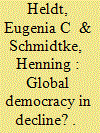

|
|
|
|
|
| Summary/Abstract |
Over the past decade, rising authoritarian regimes have begun to challenge the liberal international order. This challenge is particularly pronounced in the field of multilateral development finance, where China and its coalition partners from Brazil, Russia, India, and South Africa have created two new multilateral development banks. This article argues that China and its partners have used the New Development Bank and the Asian Infrastructure Investment Bank to increase their power and to restrict democratic control mechanisms. By comparing formal mechanisms of democratic control in both organizations to the World Bank, this article shows that civil society access, transparency, and accountability are lower at the AIIB and NDB than they are at the World Bank.
|
|
|
|
|
|
|
|
|
|
|
|
|
|
|
|
| 5 |
ID:
086349
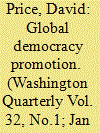

|
|
|
|
|
| Publication |
2009.
|
| Summary/Abstract |
A professed commitment to worldwide democracy promotion has been a hallmark of U.S. foreign policy for many years and was given a distinctive emphasis by the outgoing administration. President George W. Bush calls it "the urgent requirement of our nation's security, and the calling of our time."1 Promoting democracy, however, is not merely a matter of advocacy via an international megaphone. Policies of the Bush administration have led many to question the methods used to promote democracy or even the goal itself. Despite such criticism, much of it warranted, democracy promotion remains a central plank of U.S. foreign policy, an expression of U.S. values, and a tool that can be used to pursue the strategic interests of the United States. It is critically important, therefore, to learn from the mistakes of the past seven years and to rethink and refine the theory and practice of democracy promotion.
|
|
|
|
|
|
|
|
|
|
|
|
|
|
|
|
| 6 |
ID:
018114
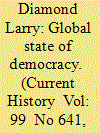

|
|
|
|
|
| Publication |
Dec 2000.
|
| Description |
413-418
|
|
|
|
|
|
|
|
|
|
|
|
|
|
|
|
| 7 |
ID:
107611
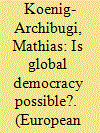

|
|
|
|
|
| Publication |
2011.
|
| Summary/Abstract |
Scepticism about the possibility of a democratically governed global polity is often rooted in beliefs about 'necessary conditions'. Some democracy scholars consider a transition to global democracy to be incompatible with necessary conditions for democratic governance, while some International Relations scholars consider it to be incompatible with necessary conditions for international structural change. This article assesses hypotheses and evidence about democratic transitions within states and transformations in the interaction among states and concludes that arguments based on necessary conditions are not compelling. This suggests that global democracy may be unlikely but it is not impossible.
|
|
|
|
|
|
|
|
|
|
|
|
|
|
|
|
| 8 |
ID:
086141
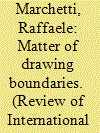

|
|
|
|
|
| Publication |
2008.
|
| Summary/Abstract |
This article defends the case for a global extension of democracy by deploying a cosmo-federalist theory. As a response to the current state of international exclusion, the radical project of stretching the paradigm of democratic inclusion to the extreme limits encompassing the whole of mankind, is here presented. The article begins by taking position for a choice-based version of consequentialism that generates a principle of political justice centred on political participation. From this, a political project is developed that envisages a cosmopolitan system where all world citizens are included within a scheme of a direct representative participation under an overarching authority governing the process of democratising world affairs. Crucial in this is the establishment of an all-inclusive authority to legitimately delineate jurisdictional boundaries and a multilayered system of political interaction.
|
|
|
|
|
|
|
|
|
|
|
|
|
|
|
|
| 9 |
ID:
123347


|
|
|
|
|
| Publication |
2013.
|
| Summary/Abstract |
Critics of global democracy have often claimed that the social and political conditions necessary for democracy to function are not met at the global level, and are unlikely to be in the foreseeable future. Such claims are usually developed with reference to national democratic institutions, and the social conditions within national democratic societies that have proved important in sustaining them. Although advocates of global democracy have contested such sceptical conclusions, they have tended to accept the method of reasoning from national to global contexts on which they are based. This article critiques this method of argument, showing that it is both highly idealised in its characterisation of national democratic practice, and overly state-centric in its assumptions about possible institutional forms that global democracy might take. We suggest that if aspiring global democrats - and their critics - are to derive useful lessons from social struggles to create and sustain democracy within nation states, a less idealised and institutionally prescriptive approach to drawing global lessons from national experience is required. We illustrate one possible such approach with reference to cases from both national and global levels, in which imperfect yet meaningful democratic practices have survived under highly inhospitable - and widely varying - conditions.
|
|
|
|
|
|
|
|
|
|
|
|
|
|
|
|
| 10 |
ID:
155158
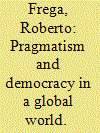

|
|
|
|
|
| Summary/Abstract |
This article discusses the advantages of a pragmatist theory of global democracy for understanding the political relevance of new phenomena such as the emergence of forms of private authority and transnational movements in tackling with global issues. The article shows in particular that the pragmatist notion of ‘publics’ offers promising insights and proves particularly promising for completing the transition from methodological nationalism to methodological cosmopolitanism that is required to understand new normative practices developing at the global level and to inquire into their conditions of validity. After having presented a basic outline of the pragmatist theory of democracy, I discuss the contribution of pragmatism to the critique of methodological nationalism and proceed then to examine and reject two alternative approaches to global politics – transnational public sphere theory and global representation theory – showing why they fail to overcome methodological nationalism. The last two sections explore private entrepreneurial authority in contexts of global governance and shows that pragmatism succeeds in explaining their political role, while the other two approaches fail.
|
|
|
|
|
|
|
|
|
|
|
|
|
|
|
|
| 11 |
ID:
106185


|
|
|
|
|
| Publication |
2011.
|
| Summary/Abstract |
After reviewing conceptual contributions that address the blurred boundary between the war and home fronts and the complexities of contemporary political topologies in general, I turn to a reading of three artistic texts—the photomontages of Martha Rosler, Paul Haggis’s film In the Valley of Elah, and Annie Proulx’s story, “Tits-Up in a Ditch”—to analyze the war front–home front relationship. I end with some reflections on the analytic contributions of montage techniques in terms of the way they establish equivalences that revalue our perspectives on the locations and actualities (presences) of war.
|
|
|
|
|
|
|
|
|
|
|
|
|
|
|
|
| 12 |
ID:
109581


|
|
|
|
|
| Publication |
2011.
|
| Summary/Abstract |
We develop and test a theory of the supply side of third-party conflict management. Building on Kydd's (2003) model of mediation, which shows that bias enhances mediator credibility, we offer three complementary mechanisms that may enable mediator credibility. First, democratic mediators face costs for deception in the conflict management process. Second, a vibrant global democratic community supports the norms of unbiased and nonviolent conflict management, again increasing the costs of deception for potential mediators. Third, as disputants' ties to international organizations increase, the mediator's costs for dishonesty in the conflict management process rise because these institutions provide more frequent and accurate information about the disputants' capabilities and resolve. These factors, along with sources of bias, increase the availability of credible mediators and their efforts to manage interstate conflicts. Empirical analyses of data on contentious issues from 1816 to 2001 lend mixed support for our arguments. Third-party conflict management occurs more frequently and is more successful if a potential mediator is a democracy, as the average global democracy level increases, and as the disputants' number of shared International Organization (IO) memberships rises. We also find that powerful states serve as mediators more often and are typically successful. Other factors such as trade ties, alliances, issue salience, and distance influence decisions to mediate and mediation success. Taken together, our study provides evidence in support of Kydd's bias argument while offering several mechanisms for unbiased mediators to become credible and successful mediators.
|
|
|
|
|
|
|
|
|
|
|
|
|
|
|
|
| 13 |
ID:
092876
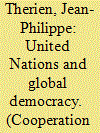

|
|
|
|
|
| Publication |
2009.
|
| Summary/Abstract |
This article shows that the idea of global democracy has been a driving force in UN discourse and policies for the past two decades. In the first part, we use official rhetoric to explain that the promotion of global democracy by the UN rests on a particular set of values and beliefs. In an analysis that parallels the interpretation proposed by cosmopolitan democratic theorists, UN leaders argue that international governance must be democratized in order to reflect the recent reconfiguration of political forces. We then examine how UN ideas are put into practice through global public policies. Structured in line with the distinction between input- and output-based legitimacy, this second part demonstrates how UN policies foster greater participation by non-state actors in the organization's deliberations and operations. The article suggests that the UN is an effective intellectual actor. By promoting civil society's greater involvement in world politics, the discourse and policies of the UN have indeed succeeded in advancing the idea of a democracy 'without borders'
|
|
|
|
|
|
|
|
|
|
|
|
|
|
|
|
|
|
|
|
|